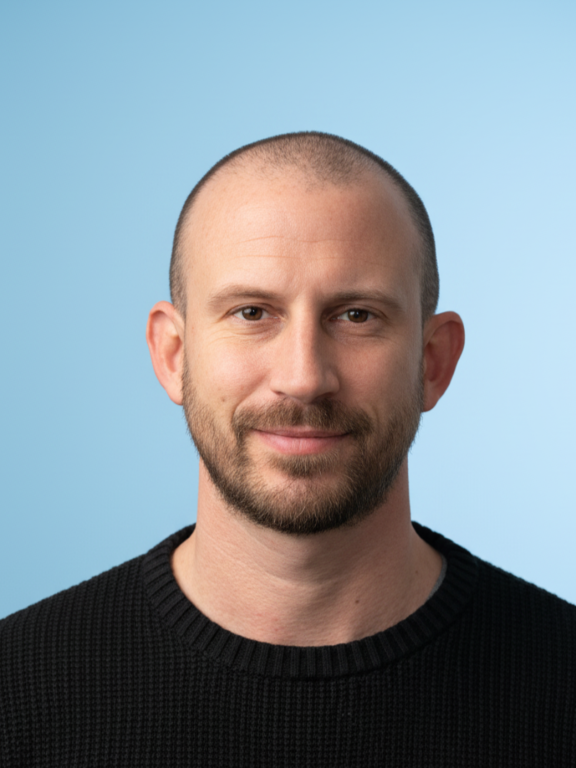SEEP Graduation
Cohort
Career
SEEP Alumni Story | July 10, 2025
Sebastian Linder
Creating change in unexpected places
It is a gray Thursday in July when Sebastian Linder and I meet at WU Vienna. I have reserved a small room looking out at the green Prater Park. Light rain falls on the trees outside, and the wind stirs the branches. When Sebastian walks in, he looks around and smiles. “This is the room where I wrote most of my master’s thesis,” he says.
Sebastian studied in the second SEEP cohort, starting in 2013. Today, more than ten years later, he works at the Vienna Economic Chamber (Wirtschaftskammer Wien), where he has spent the past three years developing the Chamber’s sustainability services almost from scratch.
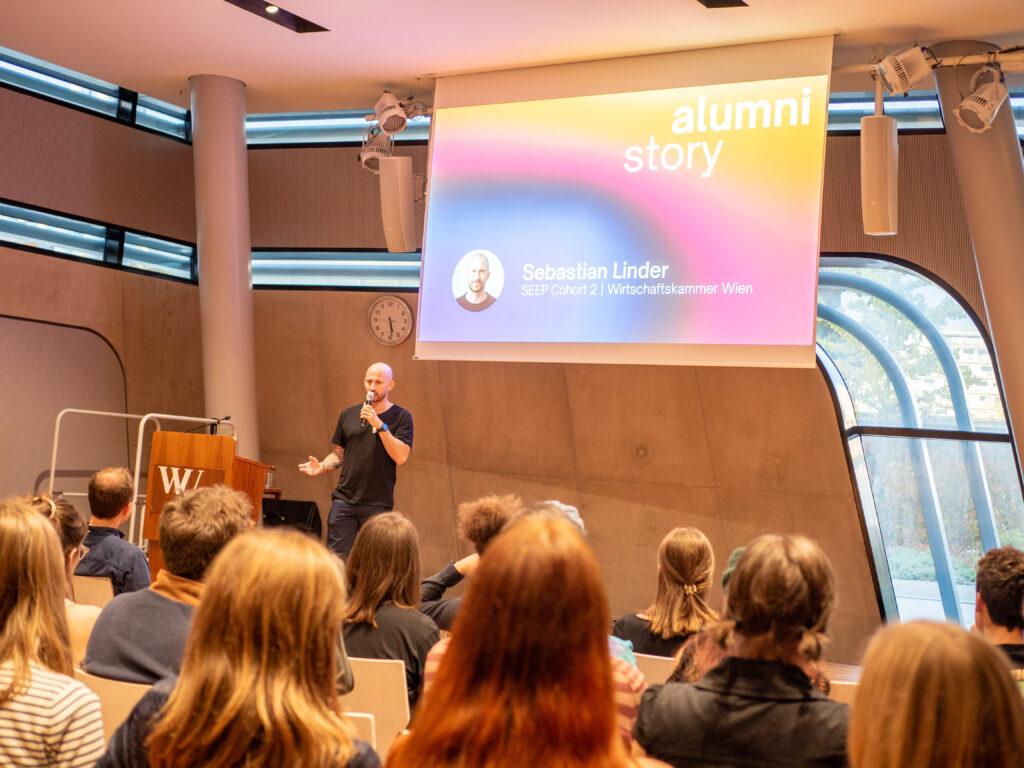
“When I started, there was no structure, no budget, and hardly any interest from companies,” he says. “They basically told me: here is your desk, do something. So I did.”
A Role That Did Not Exist
The Vienna Chamber of Commerce represents more than 100,000 businesses of all sizes and sectors. Inside this large and rather traditional institution, Sebastian’s job is to support companies on environmental and sustainability issues. That includes everything from EU energy regulations and waste management laws to circular economy strategies.
“I work on the service side of the Chamber,” he explains. “That means advising businesses that call us with questions about sustainability, the environment, waste, or energy. It can be anything, really, and I have to know the laws, the details, and the practical solutions.”
When he started, the phones were mostly quiet. Few businesses connected sustainability with the Chamber of Commerce. “We were not seen as a place to ask questions about environmental issues,” he says. “So my first task was to make us known.”
Without a marketing budget or much guidance, he began to build networks. He reached out to the Vienna Business Agency and the City of Vienna itself, even though these organizations had sometimes been more like competitors than partners.
“I had to be creative,” Sebastian recalls. “I started designing workshops, information events, and partnerships where both sides could benefit. At first, we sometimes had to cancel events because only a few people registered. But over time we became visible.”
From One Desk to City-Wide Initiatives
Three years later, the picture looks quite different. Sebastian now leads major sustainability events and supports hundreds of companies every year. One of his biggest projects is the Vienna Sustainability Week (Nachhaltigkeitswoche), which the Chamber hosted for the first time in 2024.
“We started with a tiny budget,” he says. “But it was a success. We had several events, good attendance, and for the first time people inside the Chamber noticed us.”
The 2025 edition of the Nachhaltigkeitswoche featured more than twenty events over five days, including keynotes, company visits, and practical workshops. The program focused on themes such as circular economy, decarbonization, and innovative business strategies for sustainability.
A special highlight was a keynote by Sigrid Stagl, Program Director of SEEP at WU, who spoke about “Climate Risks for the Economy.” For Sebastian, this moment captured just how much has changed. “Having an environmental economist from WU deliver a keynote at the Chamber would have been unthinkable a few years ago,” he says. “That shows how far we’ve come.”
He is proud of what they have achieved, even if resources remain tight. “There are around nine hundred employees at the Chamber,” he says. “Only two of us work full time on sustainability. But we were still asked to help shape the Chamber’s new 2030 strategy, which now includes sustainability as one of its four main pillars. Subsequently, I was entrusted with a flagship project along with significant resources. That is progress.”
Working Inside a Complex System
Working for the Chamber of Commerce is not an easy mission for someone passionate about ecological transformation. Sebastian laughs when I ask him how he manages. “It is a constant uphill battle,” he says. “We are at the bottom of the hierarchy, but we try to make things move.”
There is resistance, bureaucracy, and a culture that often prefers to stay as it is. “The Chamber is an old institution,” he says. “It moves slowly. But I am stubborn. When someone says ‘that’s not possible’, I won’t accept that.”
He tells stories of internal politics and creative diplomacy, of finding allies and quietly and subtly pushing own agendas forward. “You have to learn how to frame things,” he says. “If you call something ‘innovation’, it is much easier to get support than if you call it ‘climate policy’. Sometimes you need to speak their language.”
Despite the difficulties, he believes that change from within is possible, and that institutions like the Chamber can play a key role in transformation.
“In most organizations, change begins with one person who cares,” he says. “Someone in HR, communications, or management who decides that sustainability matters and finds allies. That’s how transformation starts.”
His advice to students who want to work this way is realistic but encouraging.
“It’s not glamorous work. You need intrinsic motivation, patience, and a high tolerance for frustration. The victories are often small and unnoticed, but they add up. And when change finally happens, you know you helped make it possible.”
The Path to SEEP
Sebastian’s journey to SEEP was not a straight one. Before starting university, he worked in various jobs, from supermarkets to the City of Vienna. Later, he completed a bachelor’s degree in International Development at the University of Vienna, where he discovered his interest in sustainability and Latin America.
He wrote his SEEP master’s thesis on Buen Vivir, the indigenous concept of “good life for all” that became part of Ecuador’s constitution. He traveled to Ecuador, interviewed politicians and academics, and explored how the original indigenous philosophy was transformed once it entered political practice.
“It was fascinating,” he says. “The contrast between the ideals of harmony with nature and the reality of oil extraction in the Yasuní National Park was striking.”
Studying SEEP While Working Full Time
During SEEP, Sebastian continued to work full time to support himself. “I would not necessarily recommend it,” he says, laughing. “It was intense. I was really tired. I stopped doing sports. It was just study, work, repeat.”
Looking back, he sees it as a valuable but difficult lesson. “I learned that you have to know your limits,” he says. “Sometimes doing less and taking care of yourself actually makes you more effective.”
He remembers SEEP as challenging and formative. “It was demanding, diverse, and sometimes chaotic,” he says. “But it shaped how I think. SEEP teaches you to see systems, to connect the economic, social, and ecological dimensions. You don’t forget that.”
One course in particular stayed with him: Clive Spash’s Philosophy of Science. “It was tough,” Sebastian recalls. “We didn’t understand half of it at first. But later you realize why it matters. It teaches you how knowledge is built and how to question assumptions. That’s something I still use every day.”
Networks That Last
Even years after graduation, SEEP connections remain strong. Sebastian still keeps in touch with classmates, some of whom now work in sustainability roles around the world. “We’re helping each other out many times,” he says. “Recently, a former classmate called me asking for a letter of support for a project. Of course I helped. That’s what SEEP people do.”
Looking Ahead
When asked what keeps him motivated, Sebastian thinks for a moment. “It’s simple,” he says. “What else should I be doing? We know what’s at stake. I have the skills and the opportunity to make a difference, even if it’s just a small one. So I do it.”
Outside of work, he finds balance through exercise, cooking, and spending time outdoors. “Nature is still what grounds me,” he says. “That hasn’t changed.”
For him, sustainability is not an abstract goal but a daily practice of persistence. “Change takes time,” he says. “But it is happening. Our job is to make sure it doesn’t stop.”
Author: Stefan Salcher
You might also like to read
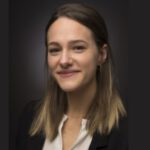
Stella Eckl
Consultant
At EY denkstatt, Stella Eckl works where business meets transformation. She shares how consulting can be a platform for change.
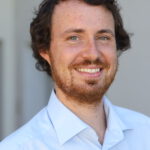
Roman Hausmann
Researcher
From juggling lectures to shaping the next generation of critical thinkers, Roman Hausmann shows how research and teaching can become powerful tools for real-world transformation.
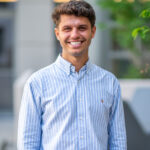
Otto Luis Barnert
Climate Finance
Otto Luis Barnert reflects on finding purpose inside complex systems and navigating the contradictions of working in climate finance while staying true to his values.

